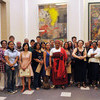Ensuring you’re exam-ready
14 May 2019 | Story Supplied. Photo Je’nine May. Read time 6 min.
The earlier you start your revision, the more peace of mind you will have come exam time on 23 May. But studying effectively so that you are properly prepared to write your exams takes planning and preparation.
Here are some tips and ideas from the University of Cape Town’s (UCT) Centre for Higher Education Development (CHED) for use during consolidation week, which starts on Thursday, 16 May, and runs until 22 May.
Get organised and get going
Where and how you study are both important, as is preparing properly so that you study effectively. UCT has many study spaces and libraries to choose from where you can revise your work, some of them open 24 hours a day, but if you prefer to work at home, try the following:
- Separate your work space from your living space, so that you don’t have any distractions.
- Don’t lie in bed and try to study.
- Put your cellphone away.
- Keep your work space clutter-free, so that you can concentrate more easily.
- Start studying as soon as possible as it will give you the time to go back to your lecturer or tutor if you have questions.
- Check out past exam and test papers to find out what kinds of questions could come up in an exam, and how long you’ll have to work on each question.
- Ask your lecturer what’s likely to come up in the exam. Try to imagine what the questions will be and then practice your answers.
- Ask your lecturer how to approach a paper and the kind of response they would like to see. If you have done the work through the course of a semester, you will pick up on these cues too.
Time it right
Doing revision in short bursts is better than an all-night cramming session. It’s also counter-productive to study for hours on end without a break as your brain needs time to absorb and make sense of things. Here are two ideas for staying mentally fresh:
- Plan a schedule that makes time for short breaks, just to take a shower or to listen to your favourite music for a while.
- Drink plenty of water and get some exercise. You donʼt need to go to the gym; a quick run or brisk walk will do the trick.
Do it your way, or in a group
Everyone has a different way of studying, whether it’s using sticky notes, making summaries, drawing mind maps or explaining things aloud. Focus on what works for you.
Avoid rote memorisation and rather try to make sense of the content. And don't try to fool yourself: Colouring everything with a highlighter pen is not much good if you’re not really applying your mind.
Working in a group can also be very effective. You can feed off each other and run things past your classmates. If you don’t know the answer, someone else may be able to help. Take turns to teach something to each other. If you can teach it, you probably know it.
Just before an exam
Take care of the simple things. It may sound trivial, but if the logistics are sorted out, there’s less to worry about.
- Ensure you’ve had some water and something to eat.
- Take a few extra pens and pencils.
- Make sure you know the location of your exam venue.
- Get to the exam venue well in time.
Writing the exam
Apart from marking the content of your paper, examiners will also be looking to see whether you can write effectively in a certain discipline, have a deeper understanding of the content, and are able to effectively apply what you have learnt.
Take a deep breath and read the entire paper first to get a sense of the questions. This is good for two reasons. If there’s anything you are unsure of, your brain files that away and starts to work on it. It also gives you a chance to see how you will need to organise your time.
- Do the questions in the order in which you can score the most points.
- Concentrate on the content you know the best.
- If you don’t know the answer to a question, move on. Don’t lose valuable time stressing about it. If you have time at the end, come back to it.
Structure your answers
Your writing style will depend on the discipline, the question and who the lecturer is.
Unless you’re asked to write in bullet points or a different style, write well-written, well-thought-through responses to longer questions or essays, with an introductory statement, some substantive statements in the middle and a concluding paragraph.
Always take into account the number of points set aside for an essay. That will give you an idea of how many facts and statements you need to include.
 This work is licensed under a Creative Commons Attribution-NoDerivatives 4.0 International License.
This work is licensed under a Creative Commons Attribution-NoDerivatives 4.0 International License.
Please view the republishing articles page for more information.
Centre for Higher Education Development
In the news


.jpg)
















































































































































































































